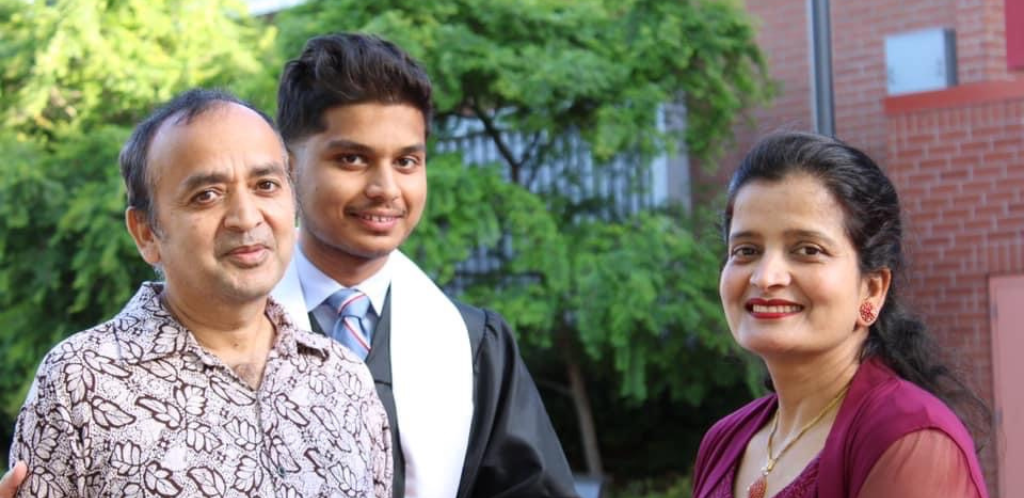The Power of Community
By Shreejal Luitel, B.S. IEOR ’24

Mentors are often the unsung heroes behind a successful career. Their importance can be crucial to navigating the waters of academia and the world after graduating. Mentors can make meaningful introductions, serve as sounding boards, and be beacons of wisdom. Mentorship is also a strong part of IEOR. We see this with Professor Righter, who followed in the footsteps of her mentor, Professor Emeritus Ron Wolff. Now, as faculty, Righter has mentored countless students and alumni, one of whom is Shreejal Luitel (B.S. IEOR ’24). Shreejal recently sat down to reflect on the importance of mentorship in this life, beginning with his very first mentor as a child, to his current mentors at Berkeley.
The chit-chat of students across open corridors; maybe Mr. Casanares would recite his “Word of the Day” – one of the many ways he helped build our third-grade vocabulary. He introduced me to the word Entrepreneur. The students in my class would follow suit, repeating the word melodically, syllable by syllable. The words autotroph and heterotroph also seemed to stick.
Third grade was perhaps my best year in school because I was blessed with a teacher who taught me the joys of curiosity. One day, we would watch a documentary about space, and another, a philosophical conversation on why the sky is the limit. In the same way Mr. Casanares tied outer space to philosophy; his curriculum interwove a handful of disciplines.
Digging through old papers and reaching out to my former elementary school led me back to Mr. Casanares. I finally found his email. Nearly a decade has passed since we last spoke, but he has never left my thoughts. I remain grateful beyond measure for his influence and impact on my life during such a formative time.
When I finally sent him an email, I was relieved for the opportunity to convey the magnitude of his impact on my life. I thanked him for introducing me to a language and culture that was utterly foreign to me. Moving to the United States was jarring. When I met Mr. Casanares in the third grade, I was a quiet kid who felt out of place in unfamiliar territory. I resigned myself to silence, not asking questions or speaking up, as far away as ever from my potential. But Mr. Casanares changed all of that. He nurtured my passion for astronomy and dedicated his time to helping me find my way. He inspired me to read books, ask questions, and keep learning.
Mr. Casanares was my very first mentor, and I look to him as a role model to this day. Mentoring others is an opportunity to pay that same debt of gratitude forward, imparting my knowledge to the next generation of leaders and building on the blueprints that Mr. C instilled in me.
Thanks to my first mentor, Mr. C, I entered my teenage years as a leader with a heartfelt desire to give back. Thanks to Mr. C, I understood the importance of community. My success is merely a reflection of those around me — the same way that lighting a bulb required contributions from Edison and Faraday, Latimer, etc. — the source of my happiness should be how I channel my energy to others. As a high school student, it was in this same spirit of community that I launched RichmondCodes, an organization that taught programming to lower-income students living in Richmond, California. I joined other programs throughout high school too, both in Richmond and Oakland, like METAS and Hack the Hood.
When I transitioned to college, my definition of mentorship evolved. As I sit in my UC Berkeley and IEOR classes, prominent for academic rigor, frequently, I do find myself struggling with my classes. Still, it is the generosity of my peers, professors, and staff — folks like Sid, Dr. Righter, and Claire —that allow me to reimagine the concept of mentorship.
Last semester, IEOR 172 with Dr. Righter sparked my passion for probability and risk analysis. This year, I am tutoring my peers as a reader for that same class. I must continue finding new ways to pay it forward and give back because, for me, mentorship is entrenched in the ideals of community, service, and teaching. Only by striving toward these ideals can I continue my academic journey at Berkeley. One day, I hope I can impact someone else’s life like my many mentors continue to move mine.